This article was co-authored by Timothy Morson and by wikiHow staff writer, Hannah Madden. Timothy Morson is a Canadian Immigration Specialist and a former Canadian Diplomat. With over 30 years of experience, Timothy specializes in Canadian immigration programs, immigration management, employer compliance, and international mobility. He holds a BA in Political Science from Concordia University and an MA in Journalism from Western University. Timothy is accredited by the Immigration Consultants of Canada Regulatory Council (ICCRC), Immigration Quebec, and is a member of the Order of Chartered Administrators of Quebec (Adm.A). He works to help people and companies around the world achieve their immigration goals.
There are 10 references cited in this article, which can be found at the bottom of the page.
This article has been viewed 87,182 times.
Nursing is a highly in-demand field in Canada, so it’s a great career path to go down. The process for becoming a nurse in Canada varies depending on the province or territory in which you plan to work, but all of them have roughly the same guidelines. We’ve answered your questions about becoming a nurse in Canada so you can get started on obtaining your dream job today.
Steps
What kind of education do you need?
-
1A bachelor’s degree in nursing. Most provincial and territorial nurses’ associations in Canada require potential nurses to have a bachelor’s degree in nursing. As the first step in your journey to becoming a nurse, check with your province or territory’s nurses’ association or regulatory body for a list of approved nursing schools and programs in your area. You can also download a current list of programs accredited by the Canadian Association of Schools of Nursing here: https://www.casn.ca/accreditation/accredited-canadian-nursing-education-programs/.[1]
-
2A Diploma of Collegial Studies program if you live in Quebec. Quebec does not require a university degree in nursing, but does require that you at least complete a 3-year Diploma of Collegial Studies (or DEC) program in nursing. If you would prefer a university degree, another option is to get a 3-year Bachelor of Science (BAC) degree in nursing.[2]
How do you get your nursing license in Canada?
-
1Apply to your provincial nurses’ association for assessment. Contact the regulatory body in your area to find out what steps you need to take to qualify for licensure in your region. Most of these bodies will require you to take 1 or more licensing exams to demonstrate your competencies in the field of nursing. For example, to begin the process of becoming a licensed nurse in Ontario, you must register with the College of Nurses of Ontario. In Quebec, all prospective nurses must apply to the Ordre des infirmières et infirmiers du Québec (OIIQ).[3]
-
2Take the National Council Licensure Exam (NCLEX). In order to become a Registered Nurse in Canada, you must pass the NCLEX. Each regulatory body or board of nursing in Canada has its own eligibility requirements for members wishing to take the NCLEX, so contact the appropriate organization in your area to find out what you need to do before applying to take the exam. Once you are ready to apply, they will provide you with the necessary application materials. After completing your application, register for the exam at http://www.pearsonvue.com/nclex/. You can also call 866-496-2539 to register by phone.[4]
-
3Meet the 4 basic requirements to be registered as a nurse in Canada. You must prove that you are fluent in written and spoken English or French, you have registration or the eligibility to register in the jurisdiction where you completed your nursing education program, you have Canadian Citizenship, Permanent Residency, or authorization to practice nursing under the Canadian Immigration and Refugee Protection Act, and that you have good character and suitability to practice. As part of the assessment of your character and suitability, you will probably need to submit to a criminal record check.[5]
How do you find a job as a nurse in Canada?
-
1Craft a good resume. A strong resume is critical to getting a nursing job. A resume is typically 1-3 pages long, and consists of a summary of your career interests, education, and experience. A nursing resume should include a brief statement of your career objectives, a summary of your education, a list of any honors and awards you have received, a summary of your work and clinical experience, and a list of any professional memberships/affiliations you have.[6]
-
2Search for nursing jobs in your area. You can find Canadian nursing job postings on a variety of general and specialist job boards. Look for jobs for nurses with your qualifications, who are registered to work in your territory or province. Nursing jobs in every territory or province in Canada are listed on the Canadian government’s Job Bank website, here: https://www.jobbank.gc.ca/home-eng.do?lang=eng. There are also region-specific job boards for nursing and other healthcare jobs, such as the Registered Nurses’ Association of Ontario’s RNCareers website: https://www.rncareers.ca/rncareers/index.htm[7]
How can I improve my chances of getting a job as a nurse?
-
1Get a specialty certification. Nurses in Canada can specialize in a variety of areas (e.g., Community Health, Critical Care, or Perianesthesia). Getting a certification after nursing school can make you more marketable and help you find jobs that match your interests. In order to qualify for a certification, you will need to have a certain amount of education and experience in your chosen area of specialization. You must also complete a certification exam.[8]
-
2Expand your horizons by becoming a Nurse Practitioner. Once you become a practicing Registered Nurse, you have the option of eventually becoming a Nurse Practitioner. NPs can order and interpret diagnostic tests, communicate diagnoses to patients, prescribe medications, and perform certain medical procedures. The requirements for becoming an NP may vary depending on the rules of the regulatory body in your province or territory.[9]
How do you immigrate to Canada to become a nurse?
-
1Get your credentials assessed before applying for work. To work as a nurse elsewhere in Canada, you must first follow a series of steps in order to qualify for a work permit. As part of your assessment, you will likely be required to take the National Council Licensure Exam (NCLEX). Contact the regulatory body in your preferred province or territory to find out how to qualify for the NCLEX. Visit this page to find information on how to contact the regulatory body/board of nursing in each province or territory: https://www.ncsbn.org/contact-bon.htm.[10]
-
2Register as a nurse in the area where you wish to work. After your credentials are assessed, you must register with either the Canadian Nurses Association (CAN) or the Canadian Council for Practical Nurse Regulators (CCPNR). The procedure for registration varies depending on the territory or province in which you are planning to work. This website has links to the pages listing registration requirements in each territory/province: https://www.cicnews.com/2013/08/coming-canada-nurse-process-082835.html#gs.AXmKbaU[11]
-
3Apply for a nursing job and a work permit. Once you’re registered to work as a nurse in Canada, the next step is to secure a job offer. You can search for nursing jobs in Canada using job search tools like the one here: https://www.canadavisa.com/canada-job-search-tool.html. After receiving a job offer, you must obtain a work permit. You can apply for a work permit online or on paper. To start an online application or download forms for a mail-in application, visit the Canadian Immigration and Citizenship website here: http://www.cic.gc.ca/english/information/applications/work.asp?_ga=2.212897300.1629361107.1519254835-883044291.1519254835.[12]
References
- ↑ http://careersinnursing.ca/new-nursing-and-students/becoming-registered-nurse
- ↑ https://www.oiiq.org/sites/default/files/uploads/pdf/admission_a_la_profession/infirmiere_formee_hors_quebec/obtain_nursing_permit.pdf
- ↑ https://www.mcgill.ca/study/2015-2016/faculties/nursing/undergraduate/ug_nur_reqs_licensure_profession
- ↑ https://www.ncsbn.org/9008.htm
- ↑ http://careersinnursing.ca/new-nursing-and-students/becoming-registered-nurse
- ↑ http://careersinnursing.ca/new-grads-and-job-seekers/career-services/job-preparation#resumes
- ↑ http://careersinnursing.ca/new-grads-and-job-seekers/find-nursing-job
- ↑ https://cna-aiic.ca/certification/get-certified/certification-nursing-practice-specialties
- ↑ http://careersinnursing.ca/new-nursing-and-students/becoming-registered-nurse
- ↑ https://www.cicnews.com/2013/08/coming-canada-nurse-process-082835.html#gs.AXmKbaU
- ↑ https://www.cicnews.com/2013/08/coming-canada-nurse-process-082835.html#gs.AXmKbaU
- ↑ https://www.canada.ca/en/immigration-refugees-citizenship/services/application/application-forms-guides/guide-5487-applying-work-permit-outside-canada.html
- ↑ https://www.canadavisa.com/quebec-skilled-worker-immigration.html
About This Article
If you want to become a nurse in Canada, start by getting the right educational background. Most territory and province’s nurses’ associations require you to have a bachelor’s degree in nursing, but make sure to check since a few areas require a 3-year Diploma of Collegial Studies program in nursing instead. Once you complete your formal education, you’ll need to apply to your provincial nurses’ association to get your nursing license. It’s likely you’ll need to take 1 or more licensing exams to demonstrate your ability to practice nursing. To become a Registered Nurse, you’ll have to pass the National Council Licensure Exam too. To learn how to find a nursing job in Canada, keep reading!

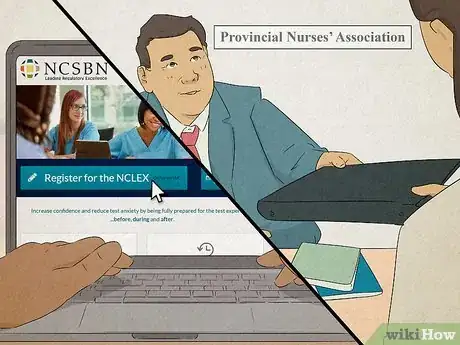
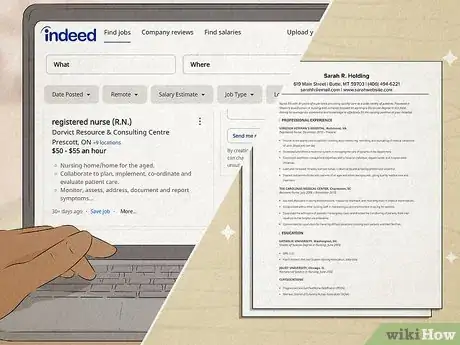
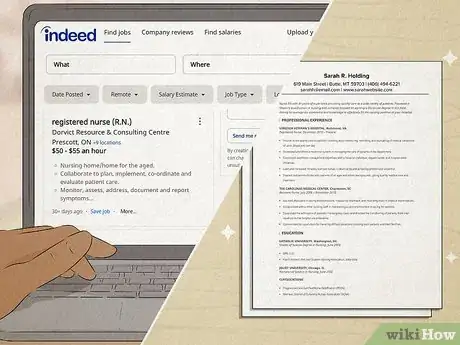
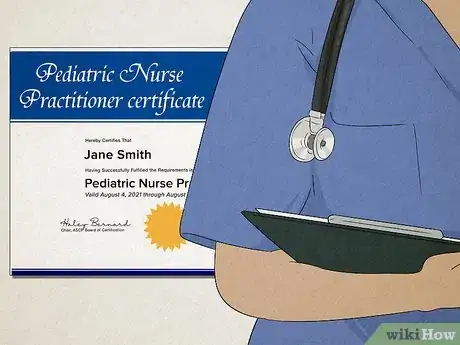
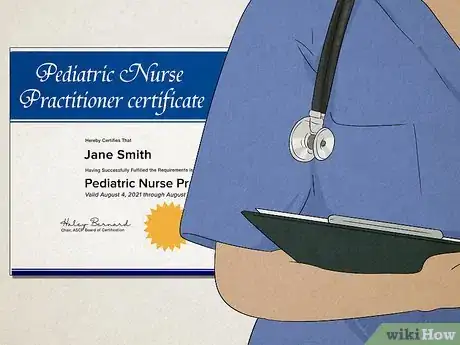









-Step-12-Version-2.webp)

-2.webp)




















































Medical Disclaimer
The content of this article is not intended to be a substitute for professional medical advice, examination, diagnosis, or treatment. You should always contact your doctor or other qualified healthcare professional before starting, changing, or stopping any kind of health treatment.
Read More...